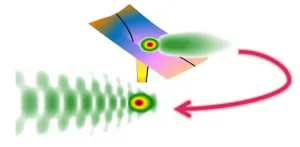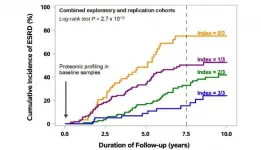(Press-News.org) **Note this is a special early release from the European Congress of Clinical Microbiology & Infectious Diseases (ECCMID 2021). Please credit the conference if you use this story**
New research being presented at the European Congress of Clinical Microbiology & Infectious Diseases (ECCMID), held online this year, suggests that people with COVID-19 frequently pass it on to their pets. Cats that sleep on their owner's bed seem to be at particular risk of infection.
Previous studies have shown that cats and dogs can catch COVID-19 from their owners but it wasn't clear how susceptible they were and what, if anything, increased their odds of becoming infected. Answering these questions is important from both a public health and animal health point of view.
To find out more, Dorothee Bienzle, a professor of veterinary pathology at the University of Guelph, Ontario, Canada, and colleagues studied cats and dogs of people who had had COVID-19.
The animals, 48 cats and 54 dogs from 77 households, were tested for antibodies to COVID-19 - a sign of past infection. Their owners were surveyed about how they interacted with their pets, including whether they petted them and kissed them and allowed them to sit on their lap or sleep in their bed. They were also asked if they allowed their pet to kiss them or lick them on the face and how long they spent with their pet each day.
Other questions included whether their pet had become ill around the time they had COVID-19 and what sort of symptoms the animal had.
75 dogs and cats living in an animal shelter and 75 stray cats that had been seen at a low-cost veterinary clinic were also tested for antibodies.
67% (32/48) of the owned cats and 43% (23/54) of the owned dogs tested positive for antibodies, showing they had had COVID-19. This compares to just 9% (7/75) of dogs and cats from the animal shelter and 3% (2/75) of the stray cats.
20% (11/54) of the dogs had symptoms, mainly lack of energy and loss of appetite. Some animals had a cough or diarrhoea, however all symptoms were mild and quickly cleared up.
27% (13/48) of the cats had symptoms, with a runny nose and difficulty breathing the most common signs of COVID-19. Although most cases were mild, three were severe.
The amount of time an owner spent with their dog and the type of contact they had with them did not affect the animal's chance of getting infected.
Cats that spent more time with their owners, however, seemed to be at higher risk of infection. And cats that slept on their owner's bed were more likely to have COVID-19.
The study's authors say that cats' biology, including their viral receptors, the "locks" the virus unpicks to enter cells, make them more susceptible to COVID-19 than dogs. Cats are also more likely to sleep near their owner's face than dogs, increasing their exposure to any infection.
They add that the higher rate of infection in animals with owners than in those from the shelter and the strays, coupled with results of previous genetic studies, means that the most likely route of transmission is from human to pet, rather than the other way round.
Professor Bienzle concludes: "If someone has COVID-19 there is a surprisingly high chance they will pass it on to their pet. Cats, especially those that sleep on their owner's bed, seem to be particularly vulnerable. So, if you have COVID-19, I'd advise that you keep your distance from your pet - and keep it out of your bedroom.
"I'd also recommend that you keep your pet away from other people and pets. While the evidence that pets can pass the virus on to other pets is limited, it can't be excluded. Similarly, although pets have not been shown to pass the virus back to people, the possibility can't be completely ruled out."
INFORMATION:
Individuals who contract COVID-19 even after vaccination are likely to have a lower viral load, experience a shorter infection time and have milder symptoms than people who are unvaccinated, according to research that includes data from ongoing University of Arizona Health Sciences studies.
"If you get vaccinated, about 90% of the time you're not going to get COVID-19," said Jeff Burgess, MD, MS, MPH, associate dean for research and professor at the Mel and Enid Zuckerman College of Public Health and principal investigator of the Arizona Healthcare, ...
MINNEAPOLIS - Finding treatments for advanced multiple sclerosis (MS) has been difficult. But new research may help neurologists identify which drugs are best for people with the advanced form of MS called secondary progressive MS. The new study, published in the June 30, 2021, online issue of Neurology®, the medical journal of the American Academy of Neurology, found that the more potent disease-modifying drugs are more effective in reducing flare-ups in secondary progressive MS than the less potent drugs that tend to be safer to take. However, the researchers found no difference in how fast the disease progressed between these two types of drugs.
Most ...
MINNEAPOLIS - A new study suggests that even when differences in socioeconomic status are taken into consideration, Black people with multiple sclerosis (MS) may be more negatively impacted by the disease than white people with MS. The research is published in the June 30, 2021, online issue of Neurology®, the medical journal of the American Academy of Neurology. The study found that Black people with MS had lower scores on certain measures of neurological health, like dexterity and walking tests and showed more evidence of disease progression on brain scans.
"While lower socioeconomic status appears to be linked to doing worse on tests ...
June 30, 2021 - For most patients, the reasons for having a facelift are simple: to "turn back the clock" for a younger and more attractive appearance. Even during the pandemic year 2020, more than 234,000 patients underwent facelift surgery, according to American Society of Plastic Surgeons (ASPS) statistics.
When considering facelift surgery, patients may ask, "How much younger will I look?" For plastic surgeons, that has been a difficult question to answer. Typically, the cosmetic outcomes of facelifting have been judged on a case-by-case basis, or with the use of subjective ratings.
Now research suggests a new, objective approach to assessing the reduction in apparent age after facelift surgery: artificial intelligence (AI) networks trained to estimate age based on facial ...
Electron motion in atoms and molecules is of fundamental importance to many physical, biological, and chemical processes. Exploring electron dynamics within atoms and molecules is essential for understanding and manipulating these phenomena. Pump-probe spectroscopy is the conventional technique. The 1999 Nobel Prize in Chemistry provides a well-known example wherein femtosecond pumped laser pulses served to probe the atomic motion involved in chemical reactions. However, because the timescale of electron motion within atoms and molecules is on the order of attoseconds (10-18 seconds) rather than femtoseconds (10-15 seconds), attosecond pulses are required to probe electron motion. With the development of ...
A recent University of Arizona College of Pharmacy study suggests that Objective Structured Clinical Examinations (OSCEs) may be a valuable means of assesing clinical skills while providing learning experiences for pharmacy students in community pharmacy settings. While the OSCEs were designed to assess health care professionals in a clinical setting, there was limited data on its use in testing skills required in community pharmacies, until now.
For pharmacists working in retail, guiding patients on the use of over-the-counter (OTC) drugs is a common part of the job. According to a recent survey from the American ...
Directing a meeting, dialing up an old acquaintance, dictating the perfect tuna salad sandwich across a drive-through window. For business and for pleasure, human beings are in constant communication.Our proclivity for socialization is lifelong, equally prominent in the lives of adolescents and adults. A recent study determined key differences in the ways that various age groups communicate, as well as one conversational component that stands the test of time: friendship. Specifically, bonds between individuals who identify as female.
Led by former Beckman Institute postdoctoral researchers Michelle Rodrigues and Si On Yoon, an interdisciplinary team evaluated how interlocutors' age and familiarity with one another impacts a conversation, reviewing the interaction's ...
Elevated levels of three specific circulating proteins are associated with protection against kidney failure in diabetes, according to research from the Joslin Diabetes Center that will be published 30th June in Science Translational Medicine.
"As well as acting as biomarkers for advancing kidney disease risk in diabetes, the proteins may also serve as the basis for future therapies against progression to the most serious types of kidney disease," said Andrzej S. Krolewski MD, PhD, senior author on the publication, senior investigator at Joslin Diabetes Center and professor of medicine ...
A 7- to 15-year longitudinal study of 358 diabetics has linked 3 proteins in blood with a slower progression of diabetic kidney disease and progressive kidney failure. The results from Zaipul Md Dom and colleagues suggest that the proteins could help researchers identify diabetics most at risk of kidney damage, potentially enabling earlier interventions and treatment. Despite advancements in blood sugar control and kidney therapies, patients with type 1 or type 2 diabetes still face a high risk of diabetic kidney disease. This condition can eventually progress to end-stage kidney disease, but some patients show slower kidney decline than others. In recent ...
Despite unprecedented advancements in technology and countless depictions of complex human-AI interactions in sci-fi movies, we have yet to fully achieve AI bots that can engage in conversation as naturally as humans can. Kushal Chawla, researcher at the USC Institute for Creative Technologies (ICT) and a doctoral student in computer science, along with collaborators at both the USC Information Sciences Institute (ISI) and ICT are taking us one step closer to this reality by teaching AI how to negotiate with humans.
The research, presented at the 2021 Annual Conference of ...


